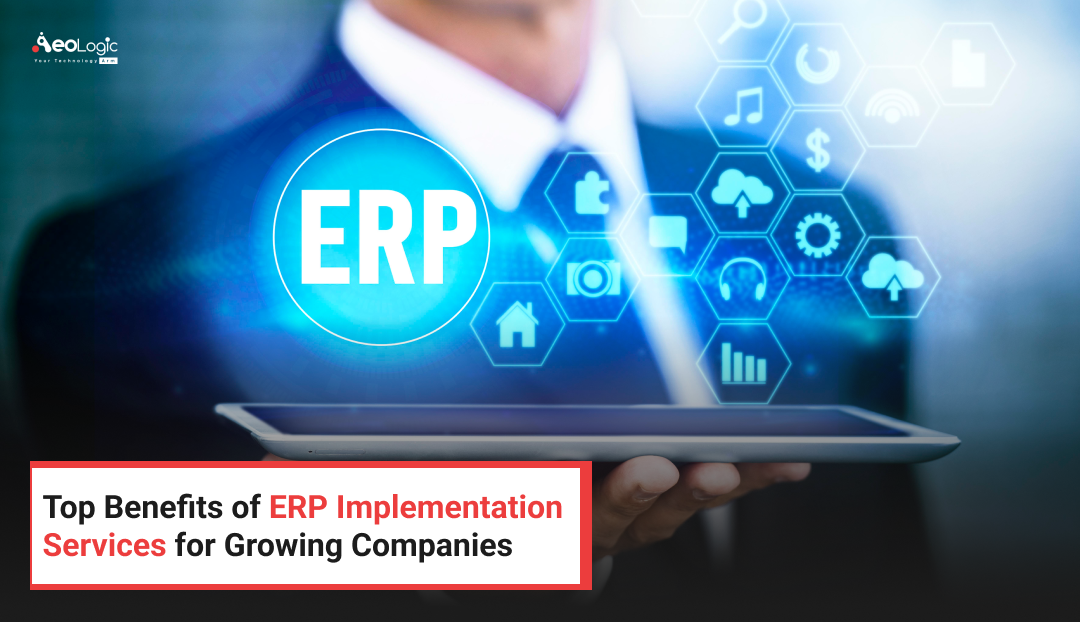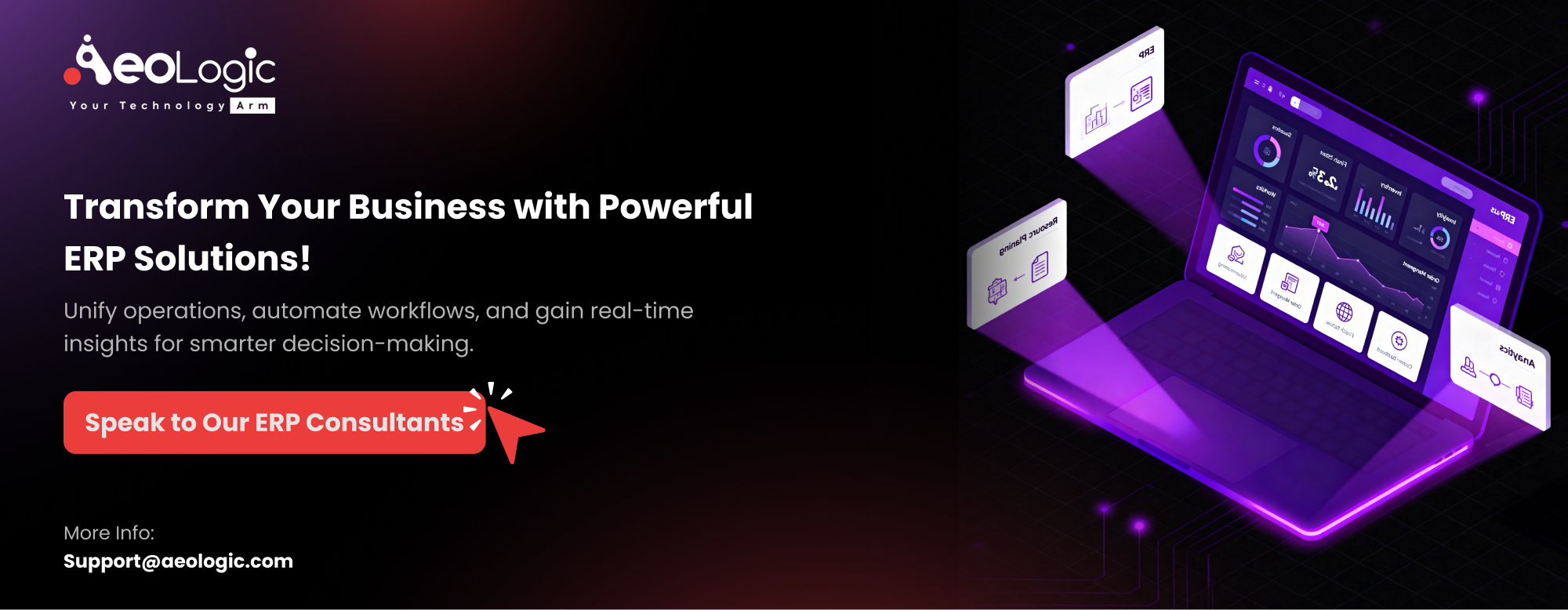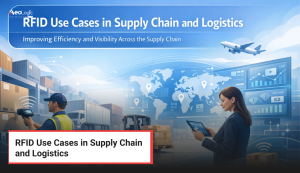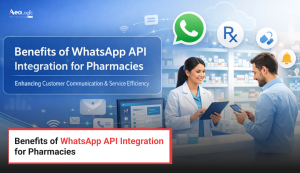A company’s internal operations get more complicated as it begins to grow—more clients, more data, more inventory, more financial transactions, more staff, and deeper interdepartmental dependencies. At this stage, many businesses realize that spreadsheets, manual processes, and disconnected tools cannot support long-term expansion. This is exactly where ERP Implementation Services become essential.
ERP implementation transforms the entire way a business operates. It minimizes inefficiencies, automates workflows, unifies departments, and provides complete real-time visibility into operations. For growing companies, it becomes the backbone for better decision-making, cost control, scalability, and sustainable growth.
However, the true value lies in how ERP software is implemented rather than just installing it.
For this reason, businesses collaborate with seasoned ERP implementation firms like Aeologic Technologies, which are reputable for assisting companies in digitizing operations, streamlining procedures, and creating scalable ERP ecosystems customized to their particular requirements.
ERP Implementation: What Is It?
The methodical process of implementing an Enterprise Resource Planning system across a company is known as ERP implementation. This comprises:
- Gathering requirements
- Mapping processes
- Personalization and setup
- Migration of data
- Integration with current systems
- Onboarding, training, and testing
- Go-live assistance
- Optimization after deployment
Implementing ERP can be compared to laying your company’s digital foundation. It’s a complete overhaul of your company’s operations, teamwork, performance evaluation, and customer service, not just a rollout of new technology.
Why Growing Businesses Need ERP Implementation Services Early
Businesses encounter problems as they grow, such as:
- Entering data twice
- Departmental misalignment
- Increasing the amount of manual labor
- Maintaining data accuracy is difficult.
- Absence of current insights
- Limitations on scalability
- Cost increases brought on by inefficiencies
By integrating all departments into a single, cohesive platform, ERP resolves these issues.
The Main Advantages of ERP Implementation Services for Expanding Businesses
The main benefits that expanding businesses get from investing in ERP system implementation are listed below, particularly when they are led by professionals like Aeologic Technologies. These advantages showcase why ERP Implementation Services are critical for scaling companies.
Benefit 1: Real-time insights and full business visibility
Centralized visibility is one of ERP’s most potent advantages for expanding businesses. Leaders have access to real-time dashboards that display:
- Performance in sales
- Levels of inventory
- Status of production
- Economic well-being
- Productivity of employees
- Consumer behavior
- Status of procurement
Business executives can make decisions more quickly and intelligently by not pursuing department heads for updates.
Real-World Example
A mid-sized retailer that expanded from 10 to 50 locations frequently overstocked or ran out of popular items due to inventory accuracy issues. Following the deployment of an ERP system:
- 99% stock accuracy was attained.
- 18% less excess inventory
- Better decision-making with real-time information
Spreadsheets and standalone tools would not allow for this.
Benefit 2: Automated workflows and streamlined operations
Growing businesses frequently function in silos:
- One tool is used in sales.
- Another is used in finance.
- Spreadsheets are used in warehouses.
- HR makes use of manual forms
- Procurement uses emails
This fragmentation is eliminated by ERP implementation services. This is one of the core strengths of ERP Implementation Services.
The Benefits of ERP Automation
- Automated creation of purchase orders
- Automatic inventory update
- Automatic invoice generation
- Payroll computations that are automatic
- Alerts for approvals that are automatically triggered
- Automated production scheduling
This lowers manual error rates, expedites processes, and boosts employee productivity.
Expert Insight:
Companies transforming manual processes into automated workflows typically save 25–40% of operational time within the first year of ERP adoption.
Benefit 3: Accurate reporting and improved financial management
The core of any expanding business is finance. However, without ERP:
- Financial information is still dispersed.
- Reporting is manual and slow.
- Making amends turns into a nightmare.
- Statements contain errors.
- Accurate forecasting is lacking in leadership.
All financial operations are centralized by an ERP, including:
- Receivables and accounts payable
- The general ledger
- Forecasting and budgeting
- Monitoring revenue and expenses
- Management of multiple locations and currencies
An Example Situation:
Excel was used for financial operations by a rapidly expanding manufacturing company. Closing at the end of the month took twelve days. Following the deployment of ERP:
- Month-end closing was shortened to three days.
- Reporting accuracy greatly increased.
- Audits became easier and quicker.
Benefit 4: All Departments Integrate Seamlessly
Growing businesses frequently experience “software chaos,” a situation in which tools are unable to communicate with one another.
ERP serves as a digital framework that links:
- CRM
- HRMS
- Tools for the supply chain
- Solutions for logistics
- Production systems
- e-commerce sites
- Tools for accounting
The Significance of Integration
Consider a situation in which:
- When a sales order is generated, inventory is automatically updated.
- Purchase orders are triggered by procurement after inventory updates.
- Finance updates the ledger after procurement receives the item.
- The order is delivered to the customer. CRM records comments
The implementation of an ERP system is the only way to achieve this kind of smooth flow.
Benefit 5: Improved Client Experience
Good customer service necessitates operational efficiency behind the scenes in addition to effective communication.
How ERP Enhances CX:
- Precise order fulfillment
- Quicker delivery times
- Inventory visibility in real time
- Decreased billing errors
- Open and honest communication
- Consistent client information among teams
- By providing these experiences, a business increases brand trust and keeps customers.
For instance:
Within six months of implementing ERP, an equipment supplier saw a 40% decrease in customer complaints as a result of increased fulfillment accuracy.
Benefit 6: Improved Inventory and Supply Chain Management
Supply chains expand and become more intricate as businesses expand. One significant bottleneck is the manual management of purchase cycles, supplier relationships, demand forecasting, and inventory levels.
By combining procurement, warehousing, logistics, and inventory operations into a single ecosystem, ERP implementation services address this problem.
How ERP Improves Supply Chain Efficiency:
- Accurately forecasts demand trends
- Minimizes stockouts and overstock
- Improves cooperation with suppliers
- Simplifies the procurement process
- Keeps track of inventory in several locations
- Gives inventory visibility in real time.
- Enhances cycle times and delivery planning
An example of a scenario:
Inconsistent stock levels across outlets were causing a growing FMCG distributor to lose money. Following ERP implementation:
- 35% fewer stockouts
- 50% less time was spent on procurement.
- The efficiency of the warehouse greatly increased.
For companies that are growing quickly, this degree of operational control is essential.
Benefit 7: Improved Departmental Cooperation
One of the main obstacles facing expanding companies is a lack of team alignment. ERP dismantles silos by providing:
- Data that is shared
- Combined dashboards
- Cross-functional processes
- Open and honest communication
- Centralized reporting
This encourages a collaborative culture where teams can concentrate on common objectives rather than handling disparate tools or resolving data conflicts.
For instance:
In a production environment:
- Sales is fully aware of what production is capable of producing.
- Production can see orders in real time.
- Procurement is aware of where to find raw materials.
- Cost and revenue data are instantly available in finance.
Productivity is greatly increased by this interconnected ecosystem.
Benefit 8: Increased Productivity of Workers
Growing businesses frequently experience employee burnout as a result of teams spending too much time on manual labor.
Repetitive tasks like these are eliminated by ERP implementation:
- Entering data
- Approvals by hand
- Counting inventory
- Paper-based human resources operations
- Making invoices by hand
- Tasks for reconciliation
When procedures are automated, workers can concentrate on:
- Work motivated by values
- Experience of customers
- Approach
- Inventiveness
- Developing relationships
The outcome? a more driven and effective workforce.
Benefit 9: Using Predictive Analytics to Make Better Decisions
Strong dashboards and analytics are features of contemporary ERP systems that assist leaders in:
- Forecast demand
- Projected income
- Create budgets.
- Determine inefficiencies
- Monitor KPIs in real time
- Enhance the distribution of resources
Leaders make decisions based on real insights rather than conjecture.
Professional Perspective:
Businesses that use ERP analytics see a 20–30% increase in the effectiveness of strategic planning.
Benefit 10: Improved Data Governance & Security
Businesses’ digital risk rises as they grow. ERP improves security by providing:
- Access based on roles
- Data that is encrypted
- Safe cloud backups
- Trails of audits
- Centralized management of data
This guarantees the protection of sensitive operational, financial, and customer data.
Aeologic Technologies Perspective:
The majority of mid-sized businesses undervalue data security until an incident happens, according to ERP specialists at Aeologic Technologies. Businesses can minimize vulnerabilities, stop unwanted access, and stay compliant with structured ERP security frameworks.
ERP Solutions’ Extra Strategic Advantages for Business Development
ERP is a long-term strategic investment that boosts a company’s competitive advantage, not just a software update.
Future Expansion Scalability
ERP systems can be extended as your company develops:
- Include additional branches
- Introduce new product categories
- Add new features
- Oversee new hires
- Encourage international growth
Enhanced Audit Readiness & Compliance
ERP assists businesses in adhering to:
- GST
- Standards for accounting
- Laws protecting data
- Industry rules
Automated documentation and audit trails save time and lower risk.
Long-Term Cost Savings
People often underestimate the cost of manual processes.
ERP lowers:
- Operational expenses
- Costs of inventory
- Errors in finance
- Risks associated with compliance
- Labor costs
- Cost of IT upkeep
Typical Errors in ERP Implementation (And How to Prevent Them)
If an ERP system is not properly implemented, even the best one may fail. Growing businesses frequently encounter issues as a result of unrealistic expectations or planning gaps.
The most frequent errors are listed below, along with solutions supported by experts.
Error 1: Failure to Establish Specific Goals
Because “competitors are doing it” or “the company is growing fast,” many companies jump right into ERP. ERP is unable to produce the anticipated ROI in the absence of clear objectives.
Resolution:
Describe specific business results, like:
- Cut inventory expenses by 15%
- Boost the speed of reporting
- Automate the purchasing process
- Reduce the sales cycle
- Boost the accuracy of fulfillment
This guarantees that the ERP is customized to meet business requirements.
Error 2: Inadequate Change Management
Workers frequently oppose new systems, particularly if they have been using the same ones for a long time.
Resolution:
- Hold workshops for training
- Clearly convey the advantages of ERP
- Include groups in the decision-making process
- Designate “ERP champions” within the company.
Adoption by users must be a top priority rather than an afterthought.
Error 3: Underestimating the Migration of Data
Even the best ERP implementation can be ruined by bad data.
Resolution:
- Prior to migration, clean up the data
- Make a formal data governance policy.
- Eliminate duplicates
- Standardize the formats
Accuracy and efficiency are ensured by migrating clean, verified data.
Error 4: Excessive Customization
ERP becomes heavy, slow, and costly to maintain when there are too many customizations.
Resolution:
Only customize when absolutely required.
Error 5: Selecting the Inappropriate Implementation Partner
One of the main causes of ERP implementation failures is this.
Resolution:
Collaborate with seasoned ERP consulting firms such as Aeologic Technologies, renowned for:
- Extensive domain expertise
- Frameworks for proven implementation
- ERP solutions tailored to a particular industry
- Strong post-go-live support
- High success rate in all areas
Choosing the right partner ensures smooth deployment, minimal risk, and long-term scalability.
The Best Ways to Implement ERP Successfully
The success rate of ERP projects can be greatly increased by implementing the following best practices.
Prior to implementation, conduct a process audit
Record the “AS-IS” procedures to determine:
- Bottlenecks
- Workloads done by hand
- Relationships
- Outdated procedures
- Possibilities for automation
This establishes the framework for creating the “TO-BE” workflows.
Choose Modules Based on Your Developmental Stage
Not every business requires every ERP module. Select modules such as:
- Money
- Stock
- CRM
- HR.
- Production
- Purchasing
- chain of supply
According to your growth objectives and stage.
Give User Adoption Priority
If workers don’t use an ERP, even the best one will fail.
Encourage adoption by:
- Practical instruction
- Role-based education
- Documents for onboarding
- 24/7 assistance throughout the launch
Use a Phased Implementation Method
Don’t deploy everything at once.
A phased strategy guarantees:
- Decreased disturbance
- Increased adoption
- Reduced danger
- Quicker ROI
Collaborate with Aeologic Technologies, a Reliable ERP Partner
A business-savvy partner guarantees:
- Easy deployment
- Precise configuration
- Customizations unique to a business
- Contemporary integrations
- Complete training
- Prompt assistance
Aeologic Technologies is a dependable option for expanding businesses because of their reputation for providing customized ERP solutions in a variety of industries, including manufacturing, retail, logistics, healthcare, and more.
Phases of ERP Implementation (Step-by-Step Framework)
The ERP implementation lifecycle is broken down as follows:
- Finding and collecting requirements
- Gap analysis and process mapping
- Design of Solutions
- Personalization and Setting Up
- Migration of Data
- Integration with Current Systems
- Testing (Module, SIT, and UAT)
- Education and Management of Change
- Go Live
- Optimization After Go-Live
Adoption will go more smoothly and with fewer mistakes if a structured process is followed.
The Reasons Aeologic Technologies Is a Reliable ERP Implementation Service Partner
Aeologic Technologies offers a special blend of:
- Industry knowledge
- Reputable frameworks
- Tailored ERP implementations
- Experience in a variety of fields
- Robust post-implementation assistance
What Distinguishes Aeologic?
- Customized ERP modules
- Proficiency with cloud and on-premise ERP
- Seamless system integration
- A strong emphasis on automation and digitization
- An agile implementation methodology
- Committed support teams
With expertise in manufacturing, logistics, supply chain, healthcare, retail, and enterprise-level digital transformation, Aeologic assists businesses in deploying ERP systems that are safe, scalable, and prepared for future expansion.
Conclusion
Businesses require more than manual tools and disjointed systems as they grow. They require automation, data-driven decision-making, unified operations, and real-time insights.
ERP implementation services provide just that. ERP lays the groundwork for long-term business success in a number of ways, including increased productivity, better reporting, smarter supply chain performance, stronger inventory control, and improved financial accuracy.
Additionally, businesses can achieve faster deployment, higher ROI, and seamless digital transformation with the help of the right partner, such as Aeologic Technologies.
FAQs
Q1. Why is ERP system implementation crucial for expanding businesses?
ERP streamlines operations, enhances visibility, automates daily tasks, lowers costs, and improves decision-making—making it essential for scaling.
Q2. How long does ERP implementation take?
Depending on the size and complexity of the business, it can take anywhere from three to twelve months using a phased approach.
Q3. What is the biggest advantage of ERP?
Real-time visibility into business operations allows leaders to make quicker, more informed decisions.
Q4. Does ERP lower operating expenses?
Indeed. ERP lowers expenses associated with manual labor, poor inventory management, late reporting, noncompliance, and disjointed systems.
Q5. What makes Aeologic Technologies the best option for implementing ERP?
For long-term success, Aeologic provides strong post-go-live support, proven implementation frameworks, deep domain expertise, and custom ERP solutions.
Q6. Which sectors gain the most from ERP?
ERP solutions have the biggest effects on manufacturing, retail, logistics, supply chain, healthcare, finance, and e-commerce.
Q7. Can small businesses use ERP?
Of course. ERP is scalable and adaptable to the size, budget, and expansion needs of a business.
ERP solutions have the biggest effects on manufacturing, retail, logistics, supply chain, healthcare, finance, and e-commerce.

Manoj Kumar is a seasoned Digital Marketing Manager and passionate Tech Blogger with deep expertise in SEO, AI trends, and emerging digital technologies. He writes about innovative solutions that drive growth and transformation across industry.
Featured on – YOURSTORY | TECHSLING | ELEARNINGINDUSTRY | DATASCIENCECENTRAL | TIMESOFINDIA | MEDIUM | DATAFLOQ







